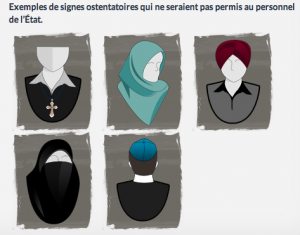With a firestorm of controversy and amidst of criticism from the likes of intellectuals and teachers, the governing Parti Québécois (PQ) released its Charter of Quebec Values today. Among a wide scope of efforts to secularize the province, the PQ proposes to ban “overt and conspicuous religious symbols.” The English release of the Charter states:
Setting Clear Rules for Everyone
Since 2006, a number of high-profile religious accommodation cases have given rise to a profound discomfort in Quebec. To maintain social peace and promote harmony, we must prevent tensions from growing.
Clear rules on religious accommodations will contribute to integration and social cohesion. They will benefit all Quebecers, including newcomers. We will be best served by a state that treats everyone the same.
Affirming Quebec Values
Contributions by Quebecers of all origins have enabled us to build an open society that shares fundamental values. These values defining Québec society and constituting a form of social contract are, among others, equality between women and men, religious neutrality of Québec’s public institutions, and recognition of a common historic heritage.
By affirming these values, we are proposing to build a strong Québec identity, whether one was born here or elsewhere.
Establishing the Religious Neutrality of the State
The state has an obligation to be neutral, which is an essential condition to ensure freedom of conscience and religion.
The best way to respect everyone’s beliefs is for the state to remain neutral and have no religion. This principle promotes pluralism by ensuring fair and equal treatment of all beliefs.
Five Proposals
Amend the Quebec Charter of Human Rights and Freedoms
We propose to entrench the religious neutrality of the state and the secular nature of public institutions in the Charter of Human Rights and Freedoms.
The Charter would also include a framework of rules to oversee ac-commodation requests. It would outline the conditions under which an accommodation could be granted. From now on, it would have to respect equality between women and men.
These modifications would result in the affirmation of Québec society’s values.
Establish a Duty of neutrality and Reserve for all State Personnel
We propose to establish by law a duty of religious neutrality and reserve for all state personnel in carrying out their duties.
This duty would reflect the state’s neutrality and its independence from religion. Civil servants are already subject to such a duty with respect to their political opinions. Persons working for the state should abstain from promoting their religious beliefs while performing their duties.
Limit the Wearing of Conspicuous Religious Symbols
We propose to prohibit the wearing of overt and conspicuous religious symbols by state personnel in carrying out their duties. This restriction would reflect the state’s neutrality. The employees in question would be :
- personnel in ministries and organizations ;
- state personnel with power to impose sanctions (judges named by Québec, prosecutors, police officers, and correctional agents) ;
- daycare (CPE) and private subsidized daycare personnel ;
- school board personnel, including those in public elementary and high schools ;
- cégep and university personnel ;
- public health network and social services personnel ;
- municipal personnel.
Read More: PQ Charter of Quebec Values


 Follow
Follow